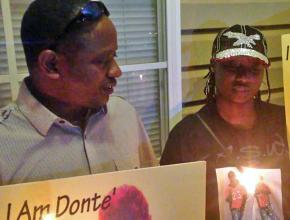Sentenced to 65 years for a cop’s crime
and report on an outrageous sentence handed down against Lakeith Smith for his friend's death--even though his friend was killed by a cop.
A'DONTE WASHINGTON was 16 years old when an unnamed police officer shot him four times, killing him. A grand jury found the killing "justified," and the officer suffered no consequences.
But there is someone who will be spending decades in prison for Washington's murder: his friend Lakeith Smith. This month, Smith was sentenced to 65 years in prison--30 years for a felony murder, 15 for burglary and two 10-year sentences for theft.
Washington was killed while he and a group of friends were breaking into a house in February 2015. Officials claim Washington pulled a gun on the officer and fired, prompting the officer to shoot.
No one denies that it was the police officer, not Lakeith Smith, who killed Washington. But Smith--who was just 15 at the time of his friend's death--was tried as an adult and convicted of felony murder after he rejected a plea deal in March that would have sent him to prison for "just" 25 years.
The harsh sentence is a result of Alabama's "accomplice liability" law, which allows the state to charge people with murder if a death occurs while they are committing a crime--even, apparently, if that death is at the hands of a cop.

In essence, Smith may now spend 30 years of his life in a cage merely because he was present when a cop killed his friend. If he lives long enough to serve his entire sentence, he will be 83 years old when he is released.
The farcical nature of the justice system was made so baldly apparent that Smith laughed out loud as he was sentenced for Washington's murder.
"I don't think Mr. Smith will be smiling long when he gets to prison," Chief Assistant District Attorney C.J. Robinson sneered. "We are very pleased with this sentence. Because the sentences are consecutive, it will be a long time before he comes up for even the possibility for parole, at least 20 to 25 years."
Jhavarske Jackson, Jadarien Hardy and La'Anthony Washington--who were also with Washington and Smith on the night of Washington's murder--have all pleaded guilty to felony murder, burglary and theft.
Though they await sentencing, they all will undoubtedly spend significant time behind bars for A'Donte Washington's murder--though likely less time than Smith, who refused the plea deal. The extra length of Smith's sentence seems to be additional punishment for exercising his right to a trial for a murder that everyone agrees he did not commit.
SMITH'S SENTENCING comes on the heels of the police murders of Stephon Clark in Sacramento and Saheed Vassell, in New York City.
Clark was holding a cell phone, while Vassell held only a pipe. Both murders have sparked renewed protest against the epidemic of police killings--especially of Black men--in the U.S. and again exposed a criminal injustice system that visits violence and destruction on Black communities.
In 2016, police killed 1,093 people, 24 percent of whom were Black, compared to 13 percent of the general population. That racial disparity is even worse among victims of police killings who were unarmed.
Despite calls for police accountability resulting from the Black Lives Matter movement, police rarely suffer any consequences for murdering Black men, women and children, beyond mandatory leave--paid vacations, essentially. Even those who are fired are often simply rehired in another department.
In the case of A'Donte Washington's death, not only did the police officer not suffer any consequences, but another Black teenager has been made to pay heavily for the killing of his friend--as will others--simply for being at the scene.
The use of Alabama's accomplice liability law in this case is a cynical move to bring the full weight of the state to bear on the lives of young Black men who could hardly be considered accomplices in a police officer shooting their friend.
Racism permeates the entire policing and criminal injustice system. There is significant racial bias evident in which neighborhoods are more heavily policed, who is stopped and searched, who is arrested, who is charged, who can make bail, who is convicted, who is sentenced to prison (and for how long), who is granted parole, and who is disenfranchised politically, economically and socially after spending time in prison.
Nationwide, police commit 8 percent of all gun deaths. Police departments should be defunded, demilitarized and disarmed.
In the meantime, killer cops should be held accountable for their own murders, not teenagers who had to watch their friend be gunned down. Police should be subjected to independent oversight and community accountability--and the racist criminal justice system must be dismantled and replaced.
As Michelle Alexander wrote in her book The New Jim Crow, "Today's lynching is a felony charge. Today's lynching is incarceration. Today's lynch mobs are professionals. They have a badge; they have a law degree. A felony is a modern way of saying, 'I'm going to hang you up and burn you.'"


